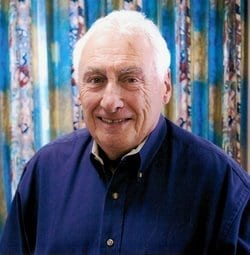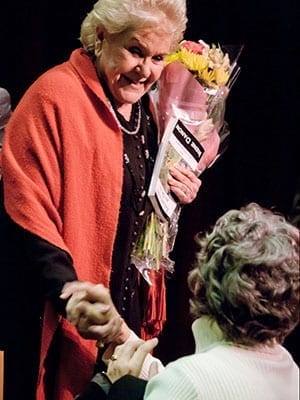
Abe Greenberg
Hiding in the Forests of Poland
Abe was born on July 26, 1936 in Lublin, Poland, but grew up with his parents, Jacob and Helen Greenberg, in the tiny village of Osmolice where the family owned forestland and operated a sawmill. Abe’s grandfather had been granted the forestland by the Czar for appreciation of 25 years of service in the Czar’s army. The bucolic life that the Greenbergs lived was violently interrupted when Germany attacked Poland on September 1, 1939 in a “blitzkrieg” that overran the Polish defenses in a matter of weeks.
In 1940, the German administrative government issued an order for all Jews in the Lublin area to report for “identification and resettlement” with failure to comply being punishable by death. Abe’s parents understood this order for what it was – transport to a concentration camp and certain death. Gathering as a family at the kitchen table, the Greenberg family decided to defy the Nazis and not report as directed. After giving away their possessions to neighbors and friends, the Greenbergs divided into small groups and ‘disappeared’ into the forests that had belonged to the family for years. Using their knowledge of the forest, the countryside, and who among their neighbors they could trust, the Greenberg family managed to elude the Nazis for four years.
Many times the family would simply ‘camp out’ in the forest while at other times they would seek refuge with neighboring Poles who risked their own lives to hide and protect the Greenberg family. Abe remembers on one occasion while he was staying with a Polish farming family the Nazi SS arrived and confronted Abe and his Polish protectors. After lining up everyone in front of a wall the Nazis raised their guns and demanded to know if any Jews were nearby. Despite the danger, the Polish family remained silent and Abe was not discovered. Hiding from the Nazis continued for four long years, until finally the Russians liberated Poland in 1944 and the Nazi threat passed.
The Greenbergs settled in the city of Lublin after the end of the war but by 1946 decided that the Soviet plans for Poland did not include embracing Jews, minorities, democracy, or freedom. Once again the Greenbergs decided to leave an oppressive government and sought a safe passage to West Germany, which was now controlled by the Americans. The first to leave Soviet controlled Poland were Abe, his uncle, and his 85 year-old grandmother. Using rural back roads and bribing the border guards when necessary, Abe and his adult relatives made it safely to West Berlin in the American sector. There they sought refuge in one of the many Displaced Persons Camps. Unfortunately, by the time the remainder of Abe’s relatives tried to leave Poland the border to Germany had been secured and passage was no longer possible. However, the Polish government was allowing Jews to immigrate to Israel and Abe’s remaining family immigrated, settled, and eventually prospered in Israel.
Abe adjusted to the life in a Displaced Persons Camp and attended school while he awaited word on what country would eventually become his home. Abe fully expected to be sent to Israel to join the rest of his family, but received word that the Jewish Community of Oklahoma City was sponsoring his visa to America. In November of 1949 Abe set sail for the United States, and although he did enter New York Harbor and did see the Statue of Liberty, his port of embarkation would be New Orleans and then a train ride to America’s heartland. In Oklahoma City Abe completed high school and then applied for a Navy ROTC scholarship to the University of Oklahoma.
What began as a means to an education soon became a calling for Abe, as he graduated college and entered the United States Navy. Rising through the ranks, Abe served on six ships, commanded the Guided Missile Frigate USS SCHOFIELD, was on station during the Cuban Blockade, and served 13 months with the Army General Staff in Vietnam. Abe went on to graduate with distinction from the US Naval War College and remained on the staff for two years prior to returning to sea duty. As captain of the SCHOFIELD, Abe became the first, if not the only, Holocaust survivor to command a U.S. naval warship. After he retired from the Navy with the rank of captain, Abe worked for the Department of Energy in Washington State before finally relocating to Prescott where he currently lives with his wife Linda.

Herman Schloss
A Jewish Boy in Nazi Germany
Herman was born into a typical rural German Jewish family on November 2, 1929 in the village of Sugenheim in the Bavarian region of Germany. Herman’s father, David, was a respected horse and cattle dealer and his mother, Anna, like his father, was a loving parent to Herman and his older sister, Marianne. In March of 1933, Herman’s younger sister, Ruth, was born and Herman was delighted to no longer be the ‘baby’ of the family. However this happiness was overshadowed by the ominous red flags emblazoned with the Nazi swastika that Herman found displayed throughout his village.
Associated with the appearances of the swastikas was a sudden change in how Herman was treated by his neighbors and friends. Herman found himself the target of hateful slurs, hostile stares, and intimidating behavior. At the entrance to his village a plaque displayed a painted face of an ugly male with a long nose and a caption that read: “Jews Not Wanted Here” and young men in brown uniforms and swastika armbands roamed the streets.
Herman had hoped when he started school in 1936 that he would find refuge from the taunts and slurs, but instead he became the direct target of persecution by his schoolmates and his teachers. Outside of the schoolhouse Herman’s classmates would regularly bully and beat him, while inside the schoolhouse, his teacher, Herr (Mr.) Rahn, tormented Herman for being Jewish.
The depth of the danger the family faced became apparent when Herman’s father was arrested for allegedly over charging a non-Jewish farmer while conducting a cattle transaction. The local judge found Herman’s father guilty of “doing business with an Aryan” and sentenced him to six months in jail and levied a substantial fine. Knowing that serving time and paying a fine would label him as a criminal, and thus prevent the family from obtaining visas to leave Germany, Herman’s father decided to appeal the judgment. Fortunately, a German attorney of Catholic faith agreed to represent Herman’s father on appeal. Following a four-hour trial in Wurzburg, in November of 1937, Herman’s father was acquitted of all charges.
Because of the escalating anti-Semitism and their recent encounter with Nazi justice, Herman’s parents made the decision to leave Germany and immigrate to America where Herman’s uncle lived. Unfortunately, deciding to leave was actually easier than being able to leave. Obtaining visas to become permanent residents of the United States was an extremely difficult, lengthy, and costly process. Somehow Herman’s American relatives were able to convince the American Consulate in Stuttgart, Germany to issue visas for the family, but there was a ‘catch’. For this desperate family of six, the Consulate would only issue three visas for the Schloss family. David and Anna Schloss were faced with a decision they did not want to make but one that had to be made – which family members would go to America and which members would stay behind in Germany.
It would be a decision that Jewish families throughout Europe would make time and time again: Who to save and who to leave behind? In the case of the Schloss family, the parents decided to take the youngest daughter with them to America and to leave Herman and his older sister, Ruth, in the care of their grandmother. The plan was to establish themselves in America and then to obtain more visas for the three left behind in Germany. One can only imagine the anxiety that young Herman experienced, not knowing if he would ever see his parents again or whether he would see America.
Fate would smile upon the Schloss family, and in late 1938 Herman, his sister Ruth, and their grandmother obtained visas for America and arrived into New York Harbor on December 9, 1938. Reflecting back upon his childhood experiences Herman stated: “After we left, the Nazis changed the message from we don’t want you to live among us to – we don’t want you to live.”
Herman went on to graduate from Queens College in New York City and had a successful career as an executive with several large international corporations. Herman is now retired and enjoys spending time with his wife, Louise, and keeps busy by teaching film in the OLLI program at Yavapai College, tutoring at the Yavapai County Juvenile Detention Center, and serving on the Board of Trustees of the Prescott Valley Public Library.

Irene Danon
Saved by President Roosevelt
Irene was born on June 15, 1929, the first child of Rachel and Sam Danon, Yugoslavian Jews who lived on the outskirts of Belgrade. Sam was an industrious businessman who owned a leather goods factory and store and Rachel was a housewife. Prior to the outbreak of war, Sam and Rachel went on to have another child, a son whom they named Ike. The Danon family’s peaceful life came to an end on April 6, 1941 when the German army invaded Yugoslavia.
Irene was only 11 years old but she vividly remembers the screeching sound of the German Stuka dive-bombers as they attacked her hometown of Belgrade with more than 300 aircraft on that spring morning. Eleven days later the German Army marched into Belgrade and everything changed for the Danon family. The bombing had destroyed their home, food was in short supply, and fear permeated the streets of Belgrade. Jews were being shot for no reason and others were being arrested and taken away to unknown fates. Irene remembers the “scary Nazis, all dressed in black.”
In November of 1941, the Nazis arrested Irene’s father and imprisoned him at the Sajmiste concentration camp just outside of Belgrade. The conditions in the camp were brutal with cold, hunger, and rampant disease. Jewish prisoners were targeted for extermination by firing squads. Irene’s father, understanding that death was imminent, was able to escape from the camp with the assistance of his sister. The Nazis in retaliation for Sam’s escape murdered Sam’s sister and her baby, a burden Sam carried for the rest of his life. For the next three years the Danon family evaded the Nazis, traveling throughout the countryside, always cold and always hungry. Whenever a temporary safe haven was found, Irene’s father would evaluate their situation and decide their next course of action.
In the fall of 1943 the Allied invasion of Italy had begun and by late September the port of Bari, on the east coast of Italy had fallen into British control. Bari was only 100 miles across the Adriatic Sea from Yugoslavia and offered the Danon family the opportunity of a permanent safe haven. However, the seaports were closely guarded, ships were scarce, and boat captains notoriously deceitful. To complicate matters, Irene’s mother was pregnant with her third child. In late November 1943, using two gold rings as payment, the Danon family bought passage from Split in Yugoslavia to Bari in Italy. On December 2, 1943 Irene’s youngest brother, Michael, was borne at a hospital in Bari, Italy.
In January of 1944 President Franklin Roosevelt created the Refugee War Board (RWB) to aid civilian victims of the Nazis. In June of 1944, President Roosevelt announced the RWB would bring to America 1,000 non-Italian refugees from Italy. Thousands of desperate people who had fled to Italy applied to be chosen for this rescue mission. Fortune would smile upon the Danon family because priority was given to families with young children. Since Michael was less than one year old, the Danon family was selected to come to America.
On July 20, 1944, the Danon family boarded the United States Army Transport (USAT) Henry Gibbons for the journey to the United States. With an escort of 13 U.S. naval warships, the Henry Gibbons sailed in a convoy with 16 other cargo and troop ships. The passage through the Mediterranean Sea was dangerous and perilous because of constant threat of German U-Boats and Nazi bombers. Finally on August 3, 1944 the Henry Gibbonsarrived into Pier 84 in New York Harbor. From New York the refugees were taken by train to Fort Ontario in Oswego, New York where they would stay until the end of the war.
In January of 1946, President Truman had the refugees bused to Niagara Falls, Canada, where they were given U.S. visas by the American consulate and then allowed to cross over the famous Rainbow Bridge into America where they could legally apply for citizenship. At long last the Danon family could call America their home. Irene went on to marry, have three lovely daughters, and to have a successful career in real estate in Southern California. Irene is now retired and lives in Prescott and continues to spread her message: “forgiveness is the key to everyone’s survival because when you forgive, you are free to move on.” At the end of her interview for this biography, Irene wanted to thank all the people of Prescott, especially the Bridge Group, for accepting her as one of them.
